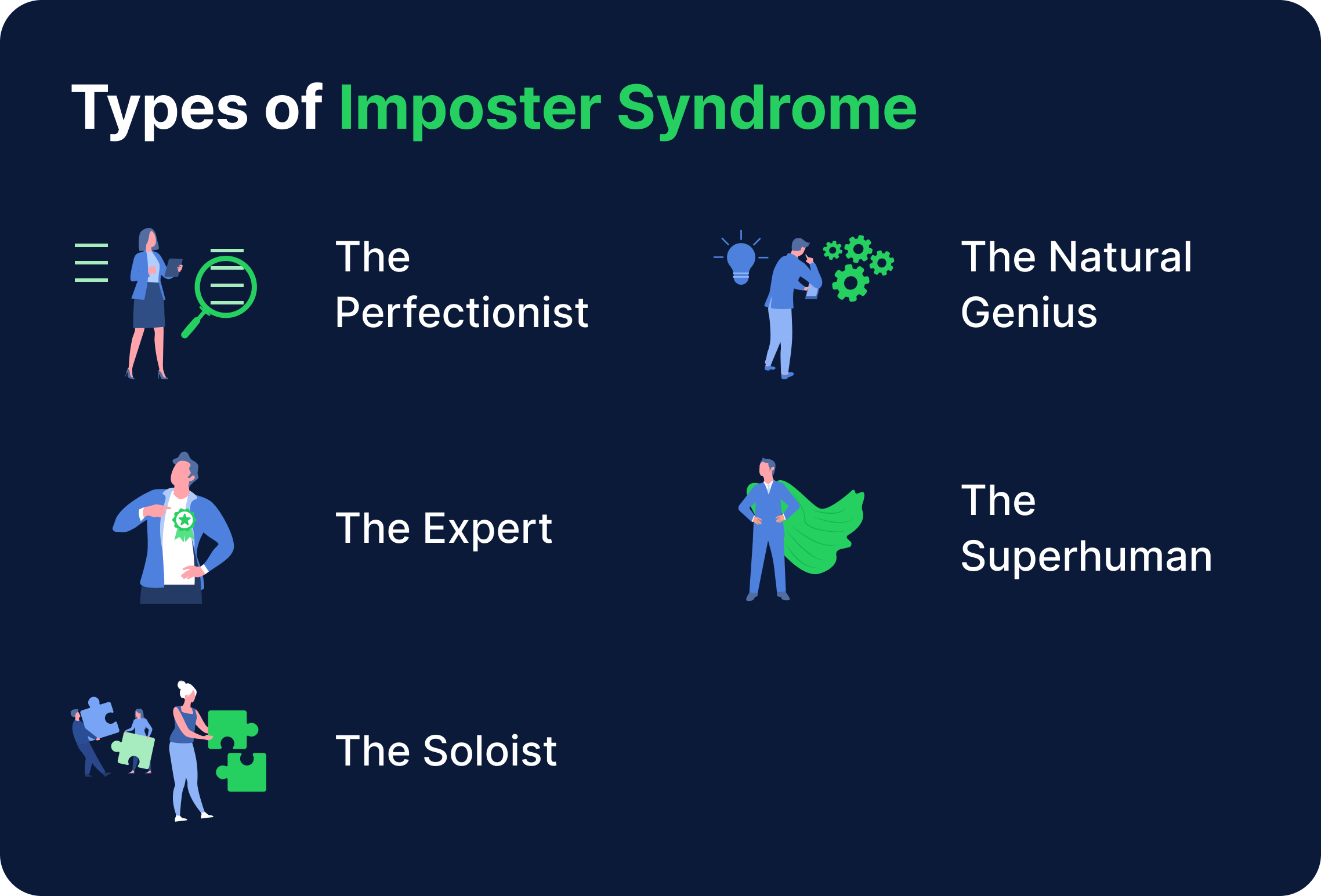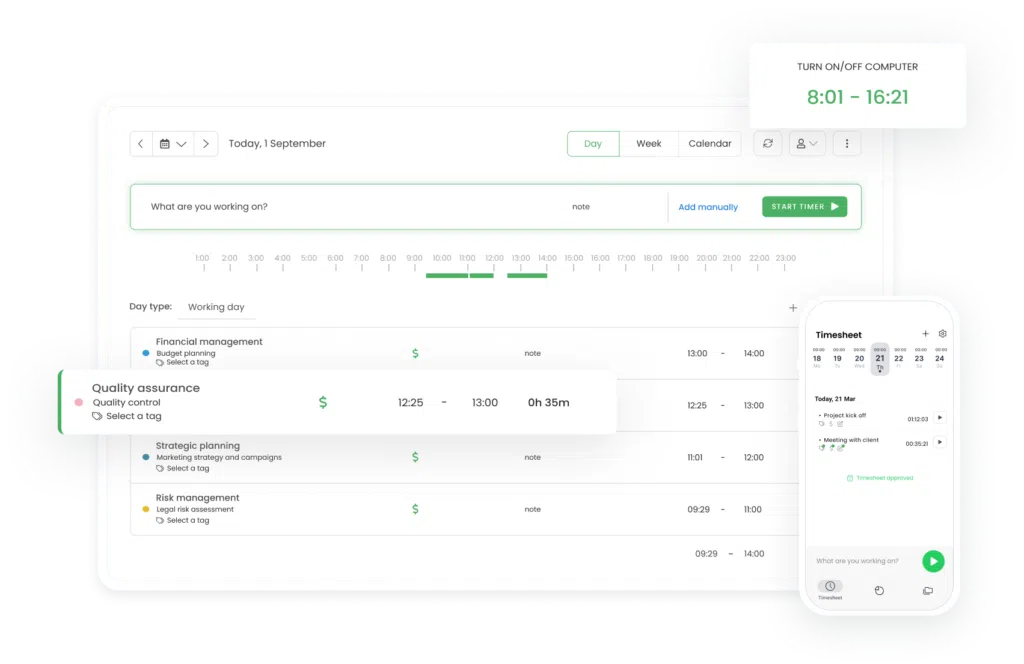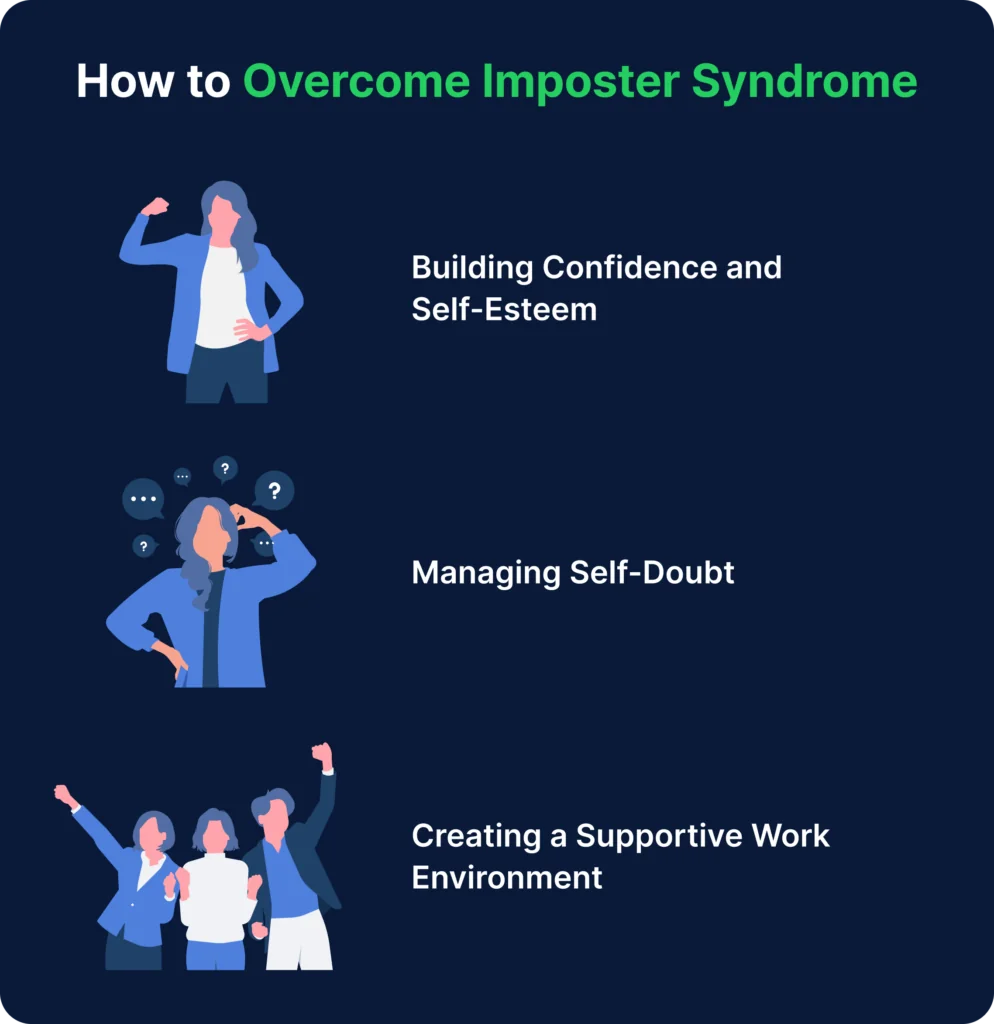Understanding Imposter Syndrome at Work
-
Kate Borucka
- January 13, 2025
- 9 min read

Have you ever felt like no matter what you do, you’re never good enough? And although the outcomes and effects of your work suggest otherwise, you feel like you’re simply terrible at your job? You’re not the only one, and you’re not weird.
Feeling like a failure is a common psychological phenomenon called imposter syndrome. According to studies, from 9 to 82% of people will most likely experience it. While it’s common in both personal and professional life, more and more people start to feel inadequate in the workplace.
What is imposter syndrome? Why does it happen? And what can you do about it? Read our guide to find out how to combat imposter syndrome effectively with time tracking!
What is Imposter Syndrome at Work?
Imposter syndrome (aka imposter phenomenon, fraud syndrome, impostorism, or perceived fraudulence; sometimes you can come across the impostor syndrome) was initially identified in 1978 by Dr. Suzanne Imes and Dr. Pauline Rose Clance. However, their observations primarily focused on successful women and other marginalized groups.
In general, imposter syndrome is a psychological phenomenon characterized by persistent feelings of self-doubt, inadequacy, and fear of being exposed as a “fraud” despite evidence of your accomplishments and competence.
It’s a sense of self-doubt related to work achievements. It makes you feel like you don’t belong or don’t deserve your job.
Imposter syndrome can affect anyone, regardless of their background or profession, but is more prevalent among high-achieving individuals, perfectionists, and those in competitive or male-dominated fields.
Types of Imposter Syndrome
Imposter syndrome can manifest in various ways. It may include overworking, heightened fear of failure, self-criticism, difficulty accepting praise, and increased anxiety and stress.
Valerie Young, a global thought leader on impostor syndrome and co-founder of the Impostor Syndrome Institute, has distinguished 5 types of imposter syndrome:

- The Perfectionist focuses primarily on “how” work is done. This includes how the work is conducted and how it turns out.
- The Expert. The main focus here is on “what” and “how much” you know or can accomplish. Since you feel the need to know everything, even a small gap in knowledge can feel like failure and bring a sense of shame.
- The Soloist will count something as an accomplishment only if it’s completed by yourself. Since you believe you must handle and solve everything independently, seeking help feels like a failure and triggers shame.
- The Natural Genius is equally concerned with “how” and “when” achievements take place. For you, competence is defined by how effortlessly and quickly things are accomplished. Struggling to learn a skill or not creating a perfect result on the first attempt feels like a failure and triggers shame.
- The Superhuman evaluates competence by “how many” roles they can successfully juggle and excel in. Any shortfall triggers shame because they believe they should handle everything flawlessly and effortlessly.
Are you seeing yourself in any of these types? If so, don’t get scared! It’s normal to have some of these traits. But if you start to doubt your own skills, you can dig deeper and check whether you or your team members are experiencing imposter syndrome.
Characteristics of Imposter Syndrome
How do you know if you, your employees, or your colleagues are dealing with imposter syndrome? You can look out for the specific symptoms.
Here are some of the main signs of imposter syndrome:
- A deep fear of failing despite steady personal growth and achieving positive results.
- Questioning your abilities, skills, and expertise.
- Comparing yourself to other team members. That can be accompanied by thinking about yourself in negative terms, even though you can be the best employee in your company.
- Attributing success to external factors, not your hard work and own skills.
- Withdrawing from team interactions.
- Striving for perfection.
- Overworking, which very often leads to burnout or health problems.
- Struggling with low self-confidence and low self-esteem. Also, persistent self-doubt.
These are the most common characteristics. Remember that these may vary depending on your personality type, situation, and other factors. Also, specific characteristics are closely correlated with the types of imposter syndrome.
For example, the Soloist who wants to always do everything on his own, will avoid team interactions. The Sperhuman may struggle with low self-esteem. Or the Perfectionist will compare herself to other team members, thinking she could do better when she’s already at her best.
Once you recognize imposter syndrome, you can quickly react and implement the right approach and tactics to fix it.
Imposter Syndrome in the Workplace
Imposter syndrome is characteristic of high achievers and people with specific personality traits. That’s why it’s so common in the workplace. However, because it happens in the heads of employees experiencing imposter syndrome, it may not always be visible on the outside.
Why does imposter syndrome happen in the workplace? In fact, it’s not something that takes place due to personal problems or personality traits. Unfortunately, the fault often lies with the company, not the employees.
Check out the most common reasons why imposter syndrome happens in the workplace and what can be done about it.
1) Impossibly high standards
Nowadays, the fast pace of things makes companies want to stay on top of the game no matter what. That very often leads to setting high standards and unrealistic goals. Everything must be done quickly, perfectly, and yield only positive results.
As a consequence, employees feel pressure and stress to do more, better, and start doubting their own abilities. This mindset can result in heightened stress, anxiety, and burnout, ultimately impeding career advancement and diminishing job satisfaction.
How to fix it?
Don’t daydream about achieving objectives that may not align with your business mission. Unrealistic expectations will only make things worse. Set SMART goals instead:
- Specific to determine exactly what needs to be achieved.
- Measurable so you can easily monitor progress. Time tracking with TimeCamp can help you keep a hand on the pulse and analyze performance with no stress to you or your employees.
- Achievable—set realistic goals that you know your employees will be able to achieve.
- Relevant—are your goals aligned with your business? Make sure they are, otherwise you’ll lose focus and miss out on opportunities for growth and success.
- Time-bound to set the right tempo for all tasks and projects.
And remember about small, actionable steps. Don’t rush. Everything needs time and space to grow.
2) Poor company culture
It’s easy to feel like an imposter when you work in a negative or harmful environment. When the leaders are focused more on the results than the employees, there’s no code of conduct, poor communication, and lots of stress, it can impact your ability to perceive yourself as a competent person.
How to fix it?
If you’re an employer, hire responsible, skilled, opened, and mature people who know their job and know their worth. It’ll foster creating an employee-friendly, diverse, and open work environment.
If you’re an employee, this is going to be more difficult. Find ways for professional development, don’t give up on your engagement, and try to do your work as best as you can. Ultimately, if the company culture affects your mental health too much, think about finding a new job.
3) Lack of feedback or recognition
A lack of positive reinforcement can make employees doubt their contributions.
Feedback and recognition are one of the biggest driving forces of every employee. If you know you’re doing your job successfully, your motivation grows.
What’s more, constructive feedback is crucial to knowing whether you’re going in the right direction. It can help refine your approach and improve your performance. No feedback is like groping in the dark.
How to fix it?
Don’t make employees seek feedback, ensure they get feedback without asking. Period. Otherwise, you’ll see a significant drop in engagement and performance. You may also experience a higher turnover rate. Dissatisfied employees more often change jobs. Positive feedback, on the other hand, can significantly encourage employees and heighten their self-worth.
When you’re an employee, simply ask for feedback.
4) Lack of work-life harmony
Many employees feel like work is like a never-ending cycle—constantly bleeding into their personal lives and leaving little room for rest or meaningful time away from the office. It’s often caused by too many tasks and stress.
Lack of support for mental well-being can contribute to experiencing imposter syndrome.
How to fix it?
Make sure that personal life and work aren’t intertwined. While one influences the other, you should set a firm boundary between the two. When you work, you work, but when you close your laptop, it’s time to rest, relax, and reset.
5) Leadership style
Poor leadership has ruined the health of many. Following the wrong leader can decrease morale and productivity and cause financial losses.
Managers who don’t follow company values, don’t engage in building friendly teams, micromanage, are bad listeners, or blame others for the lack of success are a plague.
How to fix it?
Be the safe space your employees can find comfort in (just don’t turn into a psychotherapist). Offer mutual support, turn perceived shortcomings into new challenges, and offer ways for personal development.
If you’re an employee working under a bad leader, try talking to trusted colleagues, and don’t take things personally.
PRO TIP: Use TimeCamp as your personal tool to overcome imposter syndrome. You can use it solo or with the entire team to organize work, track progress, and make better decisions. It can help spot real inefficiencies so you no longer will feel like an imposter!

6) Poor communication
According to statistics, “86% of employees and executives cite the lack of effective collaboration and communication as the main causes of workplace failures.”
Communication is crucial for work. Without it, you may experience misunderstandings, project bottlenecks, or even conflicts. This only increases your chances of doubting yourself and experiencing imposter syndrome.
How to fix it?
Communicate and collaborate effectively. Use TimeCamp, our free time tracking software to communicate people’s progress on work, view tracked time in the real-time, and ensure smooth flow of information. TimeCamp gives you clear insight into work so you always know what’s happening.
How to Overcome Imposter Syndrome?
Imposter syndrome can be detrimental to your mental health, so if you spot any symptoms in yourself, you can try to work it out. Gaining a better understanding of what is happening and why can help you effectively fix imposter syndrome.
Sometimes, imposter syndrome can be a good thing. The moment it appears, and you notice it, it’s a clear sign you need to step back and rethink what’s happening—maybe you’re working too hard, maybe you need to learn how to manage stress better, or maybe you’re taking on too much work.
Sometimes, when the problem persists, it may be a sign of underlying issues, and you may need to seek professional help.
To help you combat imposter syndrome, we’ve prepared strategies to overcome imposter syndrome:
Building Confidence and Self-Esteem
First of all, you’ll need to work on changing how you think and perceive yourself. Step by step, start reforming your patterns:
- Instead of focusing on negative thoughts, change your way of thinking—focus on strengths and positive achievements.
- Lean on friends, close coworkers, or trusted team members for support.
- You’re not a superhero, you can’t be perfect. Accept the fact that failures are part of everyone’s life and making mistakes is normal.
- Get to know your weaknesses. They can be your best friend, guiding you toward self-development. When you know what you can work on, you can become even better at what you do.
- Acknowledge and celebrate your achievements.
- You can create a digital list of things that you’re good at and review it regularly. You can even keep a digital folder of praise and achievements to boost your confidence and reinforce self-belief.
- Set yourself to have a growth mindset—don’t rest on laurels, while talent and personal abilities are just part of the puzzle, hard work and continuous self-development are the key for overcoming imposter syndrome. Growth mindset sets you up for a positive outlook on the future.
- Use TimeCamp time tracker to follow your progress and monitor achievements.
And remember, never give up creating your own healthy habits, as it takes time and continuous work to start seeing the difference.
Managing Self-Doubt
Self-doubt is one of the main productivity-killers. It can make you feel like you’re not good enough at your job. Here’s how you can work on your lack of confidence:
- Don’t worry if you experience self-doubt. It’s natural to have insecurities.
- Take care of yourself and be kind to yourself—everyone makes mistakes, and nobody’s perfect.
- Make self-compassion a priority in your life to nurture your well-being and resilience.
- Don’t focus on negative self-talk. Instead, recognize your strengths and practice mindfulness so mentally you don’t jump on that crazy self-doubt train going nowhere. Stay present in the moment.
Still doubting yourself? Try TimeCamp to see your achievements in real-time and never doubt your skills again! Sign up free!
Creating a Supportive Work Environment
According to statistics, “95% of employees say their emotional wellness impacts their productivity.” Here are some tips on how to create a supportive, thriving environment:
- Make sure your work environment is open and inclusive to everyone.
- Be clear about what you expect from your employees.
- Encourage open collaboration and communication.
- Provide regular feedback. Meaningful feedback is crucial for employee well-being and good development.
- Support your employees in their career growth by offering them ways to develop new skills.
- Encourage open discussions about imposter syndrome and acknowledge its existence within the organization.
If you’re an employee working in a toxic environment, and can’t influence it, try to find support groups outside your work.

Overcoming Imposter Syndrome: A Journey of Self-Acceptance
Imposter syndrome is a common mental state that can affect all people working in different backgrounds and professions. But if you recognize the signs quickly, whether as an employee or an employer, it can be overcome successfully.
Remember that by addressing imposter syndrome, you can become confident again, believe in yourself, and excel at your career.
Sources:
Imposter Phenomenon by Martin R. Huecker; Jacob Shreffler; Patrick T. McKeny; David Davis.: https://www.ncbi.nlm.nih.gov/books/NBK585058/
You’re Not an Imposter. You’re Actually Pretty Amazing. https://hbr.org/2022/01/youre-not-an-imposter-youre-actually-pretty-amazing
Impostor syndrome: https://en.wikipedia.org/wiki/Impostor_syndrome
The 5 Types of Impostor Syndrome by Valerie Young: https://impostorsyndrome.com/articles/5-types-of-impostor-syndrome/
Communication in the Workplace Statistics 2024: https://pumble.com/learn/communication/communication-statistics/
Workplace Statistics to Shape Your People Strategy in 2025: https://www.deel.com/blog/workplace-statistics/


